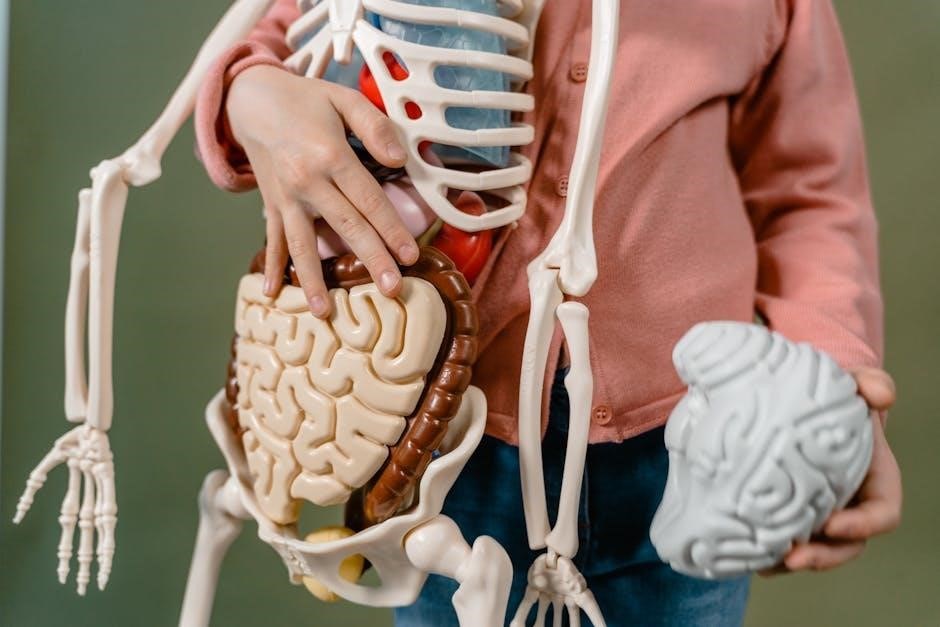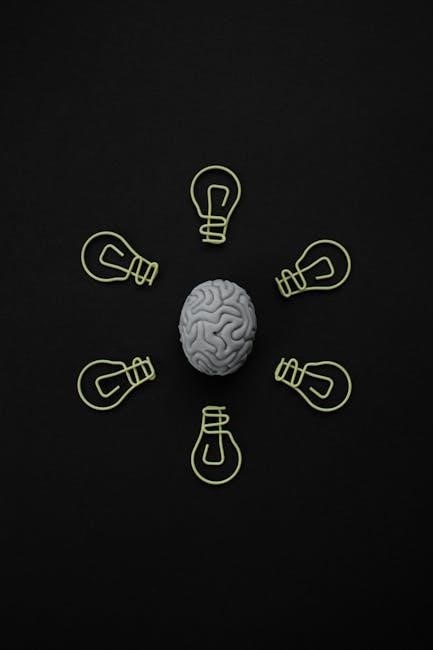This text introduces the 4th edition of “Learning and Memory: From Brain to Behavior,” exploring how brain function shapes learning and memory processes in humans.

1.1 Overview of the Book
The 4th edition of “Learning and Memory: From Brain to Behavior” provides a comprehensive exploration of memory processes, from brain function to behavioral expression. It covers key topics like memory stages, neuroplasticity, and strategies to enhance learning. Updated with recent research, the book bridges theory and practice, offering insights for students, educators, and professionals interested in cognitive science.
1.2 Key Concepts and Themes
Central themes include memory stages, synaptic plasticity, and the brain’s role in learning processes. Concepts like encoding, storage, and retrieval are explored in depth, offering a scientific foundation for understanding human cognition and memory.

The Biological Basis of Learning and Memory
The brain’s structures and processes, including neurotransmitters and synaptic plasticity, form the foundation of learning and memory, enabling information encoding, storage, and retrieval.
2.1 The Role of the Brain in Memory Formation
The brain plays a central role in memory formation by processing information through regions like the hippocampus and amygdala, which encode, store, and retrieve memories, linking emotions and experiences to learning efficiently.
2.2 Neurotransmitters and Synaptic Plasticity
Neurotransmitters, such as dopamine and acetylcholine, play a crucial role in facilitating communication between neurons, enabling learning and memory. Synaptic plasticity, the brain’s ability to strengthen or weaken neural connections, is vital for memory formation. Processes like long-term potentiation (LTP) enhance synaptic efficiency, allowing information to be stored and retrieved effectively, highlighting the dynamic interplay between neurotransmitters and neural adaptability in cognition.

Stages of Memory
Memory progresses through stages: sensory memory, short-term, and long-term storage. Each stage involves distinct processes, ensuring information is filtered, retained, and retrieved efficiently over time.
3.1 Sensory Memory, Short-Term Memory, and Long-Term Memory
Sensory memory briefly holds sensory data, while short-term memory retains limited information for immediate use. Long-term memory stores vast amounts of information over extended periods, enabling learning and recall through complex neural pathways and consolidation processes, as discussed in the provided sources, highlighting their distinct roles in human cognition and memory formation.
3.2 The Process of Encoding, Storage, and Retrieval
Encoding involves processing information into memory through sensory or cognitive pathways. Storage retains this information, while retrieval accesses it for use. These stages are crucial for learning, with effective encoding enhancing long-term retention and retrieval efficiency, supported by neural mechanisms and strategies like repetition and association, as outlined in the book and online resources, aiding memory consolidation and access.
Factors Influencing Learning and Memory
Emotional states, sleep quality, and stress levels significantly impact learning and memory, with emotions enhancing or impairing memory consolidation, and sleep playing a critical role in memory processing and retention, as supported by research and online studies on cognitive function and memory optimization.
4.1 Emotional States and Their Impact on Memory
Emotional states significantly influence memory, with heightened emotions often enhancing memory formation. Stress and anxiety can impair memory consolidation, while positive emotions may strengthen recall. The brain’s amygdala plays a crucial role in linking emotions to memories, impacting both short-term and long-term retention. Understanding this connection is vital for optimizing learning strategies and addressing memory-related challenges.
Research highlights that emotional arousal increases the release of neurotransmitters like dopamine, reinforcing memory storage. Conversely, chronic stress can disrupt hippocampal function, affecting new memory formation. Balancing emotional states and managing stress are key to improving cognitive function and memory efficiency in various learning environments.
4.2 The Role of Sleep in Memory Consolidation
Sleep plays a critical role in memory consolidation, with research showing that it strengthens neural connections and transfers information from short-term to long-term memory. During REM and deep sleep stages, the brain replays and processes experiences, enhancing learning and recall. Lack of sleep disrupts this process, impairing memory retention and cognitive function. Adequate sleep is essential for optimal memory performance.

Studies indicate that sleep deprivation reduces the brain’s ability to consolidate memories, leading to poor retention of new information. Neurotransmitters like norepinephrine, serotonin, and acetylcholine are active during sleep, facilitating memory storage. Chronic sleep deprivation can result in impaired synaptic plasticity and increased risk of memory-related disorders, emphasizing the importance of prioritizing sleep for cognitive health.
Memory Retrieval and Forgetting
Memory retrieval is the process of accessing stored information, crucial for learning. Forgetting occurs due to decay, interference, or lack of retrieval practice, hindering cognitive function.
5.1 Strategies to Enhance Memory Retrieval
Effective strategies to enhance memory retrieval include spaced repetition, chunking information, and active recall. Mnemonics, such as acronyms or mental images, can also aid in organizing and retrieving information efficiently. Additionally, practicing retrieval in different contexts strengthens memory traces, making them more accessible. These techniques, discussed in “Learning and Memory: From Brain to Behavior,” are supported by cognitive neuroscience research and practical applications in education and daily life.
5.2 The Science of Forgetting and Memory Loss
Forgetting and memory loss stem from natural brain processes like synaptic decay and interference. The brain’s ability to forget helps optimize memory efficiency, yet pathological memory loss, such as in Alzheimer’s, involves specific neural malfunctions. Research in “Learning and Memory” explores these mechanisms, offering insights into both normal forgetting and clinical conditions, while also discussing potential interventions to mitigate memory decline and cognitive impairments.

Practical Applications of Learning and Memory
Techniques like active recall and spaced repetition enhance learning efficiency. Memory training and cognitive strategies are applied in education and rehabilitation to improve retention and performance.
6.1 Techniques for Effective Learning
Effective learning involves strategies like chunking information, active recall, and spaced repetition. These methods enhance retention and comprehension. Additionally, understanding concepts rather than memorizing facts promotes deeper learning. Techniques such as mind mapping and self-testing can also improve knowledge retention. Incorporating regular breaks and staying focused helps maintain productivity. These approaches are widely recommended for optimizing learning outcomes and long-term memory retention.
6.2 Memory Training and Cognitive Enhancement
Memory training incorporates techniques like mnemonics and brain exercises to enhance cognitive function. Tools such as memory games and apps target areas like attention and working memory. Cognitive enhancement strategies, including mindfulness and physical exercise, improve overall brain health. These methods are designed to boost memory performance and promote mental agility, supporting long-term cognitive well-being and adaptability in various learning environments effectively.
The Intersection of Technology and Learning
Technology influences learning and memory by altering how the brain processes information. Digital tools reshape cognitive functions, enhancing or disrupting traditional memory formation and retrieval processes.
7.1 How Internet Access Affects Brain Function
Internet access alters brain function by enhancing quick information retrieval skills but potentially weakening deep cognitive processing. Frequent online searches may reduce reliance on personal memory storage, impacting long-term retention and critical thinking abilities. The brain adapts by prioritizing efficiency over thorough understanding, reflecting a shift in how information is accessed and processed in the digital age.
7.2 The Role of Digital Tools in Modern Learning
Digital tools revolutionize learning by offering interactive platforms, personalized resources, and real-time feedback, enhancing engagement and efficiency. They enable diverse learning strategies, such as spaced repetition and gamification, which improve memory retention and cognitive flexibility. Tools like memory training apps and educational software support tailored learning experiences, making them indispensable in today’s educational landscape.

The Future of Learning and Memory Research
Emerging trends in cognitive neuroscience and innovative memory techniques are revolutionizing our understanding, unlocking potential for enhanced learning and memory capabilities in future generations.
8.1 Emerging Trends in Cognitive Neuroscience
Recent advancements in neuroimaging and synaptic plasticity research are reshaping our understanding of brain function. Studies explore how memory consolidation and retrieval are influenced by neural networks
and technological interventions, offering insights into enhancing cognitive abilities. These trends highlight the potential for groundbreaking therapies and educational strategies, bridging gaps between neuroscience and practical applications in learning and memory.
8.2 Innovations in Memory Enhancement Techniques
Advancements in memory enhancement include techniques like mnemonics, spaced repetition, and brain training apps.
These tools leverage cognitive science to improve retention and recall. Additionally, emerging technologies such as neurofeedback and transcranial stimulation show promise in boosting memory capacity. These innovations aim to optimize learning processes and address memory impairments, offering practical solutions for both education and cognitive rehabilitation.

Case Studies and Real-World Examples
Real-world examples highlight practical applications of memory strategies, showcasing how techniques enhance learning and address impairments in diverse contexts, providing evidence-based insights into cognitive rehabilitation.

9.1 Successful Applications of Memory Strategies
Case studies reveal how memory strategies like chunking, mnemonics, and spaced repetition enhance learning. For instance, brain coach Jim Kwik’s techniques help individuals absorb information faster. Real-world examples show improved academic performance and professional success through these methods. Mind mapping and active recall are also highlighted as effective tools for retaining complex information, demonstrating practical benefits in everyday learning and cognitive enhancement.

9.2 Overcoming Memory Impairments
Techniques like cognitive routines, such as STOP, think, and act, help individuals with memory impairments learn new information. Memory training programs, including those by brain coach Jim Kwik, offer practical strategies. Studies show handwriting boosts brain connectivity, aiding memory. These approaches empower individuals to adapt and thrive, demonstrating the effectiveness of targeted interventions in real-world scenarios.
This insight into learning and memory is crucial for enhancing human cognition and behavior, shaped by technology and effective strategies, as explored in the book.
10.1 Summarizing Key Insights
The book “Learning and Memory: From Brain to Behavior” provides a comprehensive understanding of how memory forms, the brain’s role, and factors like emotions and sleep that influence learning. It explores memory stages, retrieval strategies, and forgetting mechanisms, offering practical techniques to enhance cognitive function. This insights help optimize learning strategies and address memory impairments effectively.
10.2 The Broader Impact of Understanding Learning and Memory
Understanding learning and memory processes has profound implications for education, cognitive science, and personal development. By optimizing how we acquire and retain information, we can enhance educational methods, improve mental health interventions, and develop technologies that support cognitive function. This knowledge empowers individuals to maximize their potential and contributes to societal progress in various fields.
